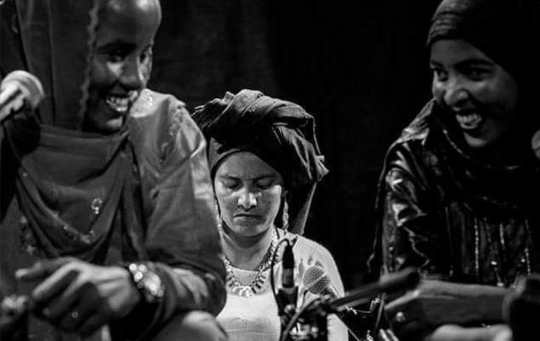|
Despite years of war, exile, and imprisonment, fighting for a homeland in the Northern Sahara, the music of young Tuareg people, fueled and defined by high-voltage rock and roll guitar riffs, has made sizable inroads into the European pop scene while gaining some traction in the US. Traditionally the province of men, a young woman from a semi-nomadic scrubland village in Niger, Fatou Seidi Ghali, had the temerity to steal away with a cousin’s electric guitar and taught herself to play. Ghali has become the first professional female guitarist amongst the Tuareg. With Alamnou Akrouni and Amaria Hamadalher, Ghali formed Les Filles de Illighadad (The Daughters of Illighadad, their native village), in 2017, the first female Tuareg band. A cousin of Ghali, Abdoulaye Madassane, plays more or less rhythm guitar, but his key role is to negotiate for the women in situations where they may not, and to act as their de facto chaperone.
Tendé is what Tuareg women's music is called and the tendé drum is its signature instrument. The tendé is made from a large mortar covered in goat hide, set onto a frame devised of two pestles that form the base of the drum’s frame. Two women will sit on either side of the drum, holding it down while the tendé is played by a third woman. The instrument is iconic, as the mortar and pestle in many parts of Africa is vital to women’s work and thus their role in society. The sound of townswomen rhythmically pounding grains, rice, sorghum, millet, in the courtyard of their compounds, oftentimes chanting, and with babies strapped to their backs as they drop rather than pummel the pestle into the mortar to separate off the chaff, is what awakens, with music, their communities.
Other Tendé instruments include handclaps and a calabash about the size of a soccer ball that bobs in a tub of water and is beaten with a dull mallet; they are portable and essential to a beduin culture. Now, the electric guitar joins the Tendé roster. In fact bandmember, Amaria Hamadalher has begun to play, too.
Recorded in Brooklyn, New York in 2021, At Pioneer Works is the group’s third album. That show put the band on the watch- and playlists of African music fans in the States, even garnering them a performance at the Library of Congress. One YouTube viewer confessed of the performance video: “I don’t know what is being said, but I have goose bumps and tears in my eyes.”
In her innocence, the writer captured the magic of the group. There is a command in Les Filles’ music that delivers you, compelling you to move with the women, body and soul, if you wish, into their soulful rhythms, which are a simple, 1 - 2, and range from laconic to energized, always mesmeric. Their music feels ancestral. It feels communal. It feels womanly, and it is organic despite the newfound wires.
The lyrics of the album’s six songs are poetic, romantic and touch on traditional societal themes, such as the shaming of women adulterers. In “Telitit” they sing, “I prefer death/or embers stuck to my heart/…that it would be said amongst my people that I committed adultery.”
Branded by the tendé and guitar, their songs have a similar structure and sound that don’t vary significantly, and it can be difficult for a desultory ear to differentiate among the tunes. “Surbajo,” for example, opens with that insistent 1 - 2 rhythm; the affect deepens as the tendé drum’s deep resonance kicks in. These are simple lines sung in Tamasheq, the language of the Tuareg. The repetition doesn’t wear on you, but brings you closer to an understanding or internalizing of how trance-inviting, or at least meditative, the music is, more so than that of their male counterparts, like Tinariwen or Mdou Moctar, for example, whose aspect is sophisticated and Westernized.
Les Filles frequently call out to other women in their songs; this adds to the feeling of bonding and suggests the more complex relationships women have in traditional cultures, especially in polygamous ones, than one might imagine. When you think of the ages old traditions that they are documenting with their songs, of their lives as nomadic and desert people defined by isolation from contemporary world culture, you begin to understand what a tremendous step Seidi Ghali is taking along with her sister Filles in beginning to step away from some of the strictures they’ve lived under.
I understand that, just as another guitar is stretching further the bounds of Tendé, other departures are in store for Les Filles de Illighadad, yet I feel confident that, despite the changes, the modernization, the wonder and ancestrality of this breakthrough band will endure, as will its essence as “women’s music.”
|
